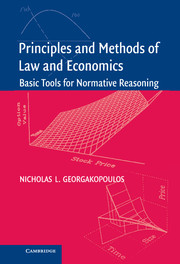Book contents
- Frontmatter
- Contents
- Preface
- INTRODUCTION: INNOVATION IN LEGAL THINKING
- PART 1 PRINCIPLES
- PART 2 METHODS
- 7 MATHEMATICAL MODELING
- 8 CONFRONTING UNCERTAINTY: BASIC PROBABILITY THEORY
- 9 ADVANCED PROBABILITY: DISTRIBUTIONS AS THE SHAPE OF RANDOMNESS
- 10 HOW TO PRICE UNCERTAINTY: FINANCE
- 11 FINANCE AND PROBABILITY: OPTIONS AND DERIVATIVES
- 12 USING SPREADSHEETS
- 13 STATISTICS
- 14 CONCLUSION: IMPORTING METHODOLOGICAL INNOVATIONS
- APPENDIX A MEINHARD V. SALMON 249 N.Y. 458 (1928)
- APPENDIX B GLOSSARY
- APPENDIX C MATHEMATICA NOTEBOOKS
- Index
8 - CONFRONTING UNCERTAINTY: BASIC PROBABILITY THEORY
Published online by Cambridge University Press: 24 July 2009
- Frontmatter
- Contents
- Preface
- INTRODUCTION: INNOVATION IN LEGAL THINKING
- PART 1 PRINCIPLES
- PART 2 METHODS
- 7 MATHEMATICAL MODELING
- 8 CONFRONTING UNCERTAINTY: BASIC PROBABILITY THEORY
- 9 ADVANCED PROBABILITY: DISTRIBUTIONS AS THE SHAPE OF RANDOMNESS
- 10 HOW TO PRICE UNCERTAINTY: FINANCE
- 11 FINANCE AND PROBABILITY: OPTIONS AND DERIVATIVES
- 12 USING SPREADSHEETS
- 13 STATISTICS
- 14 CONCLUSION: IMPORTING METHODOLOGICAL INNOVATIONS
- APPENDIX A MEINHARD V. SALMON 249 N.Y. 458 (1928)
- APPENDIX B GLOSSARY
- APPENDIX C MATHEMATICA NOTEBOOKS
- Index
Summary
One of the greatest breakthroughs in the history of mathematics is the development of the ability to quantify uncertainty with probability theory. That is very important for law and economics because individuals and the legal system act under uncertainty. Law-and-economics analysis is only correct if it accounts for uncertainty and for actions in view of uncertainty.
The setting of deciding Meinhard v. Salmon illustrates the importance of probability theory. Salmon received a lucrative offer from Gerry, a business acquaintance. The offer could have expanded Salmon's business. Unbeknownst to Gerry, Salmon's business, which was the reason for their acquaintance, had a secret partner, Meinhard. If Gerry knew that Salmon operated in two capacities, as an individual and as a member of a partnership, then Gerry may have specified which of the two he selected as the recipient of his offer. Meinhard, the invisible partner, claimed the offer should be treated as made to the partnership. The litigation that Meinhard started eventually reached the highest court of the jurisdiction and the famous American judge, Benjamin Cardozo, and his colleague Andrews, who is almost equally famous for his vocal dissenting opinions. Previously established law did not answer the question directly. If Cardozo's court attempted the analysis of this setting without being sensitive to uncertainty, they would be missing crucial information. The court established precedent for an uncertain event, the appearance of a lucrative offer or opportunity.
Information
- Type
- Chapter
- Information
- Principles and Methods of Law and EconomicsEnhancing Normative Analysis, pp. 154 - 174Publisher: Cambridge University PressPrint publication year: 2005
